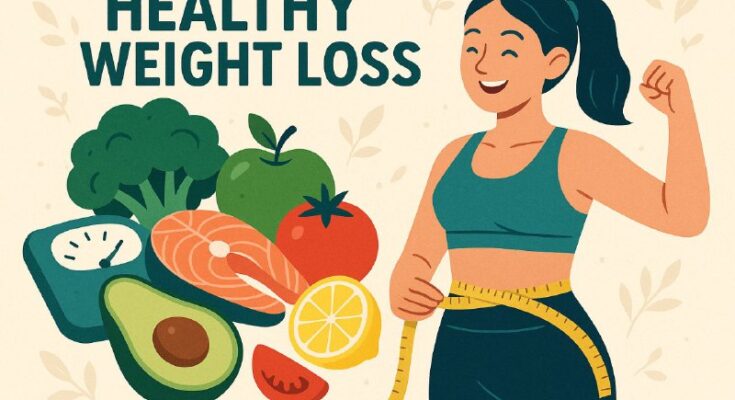Healthy Weight Loss: Losing weight does not need to be based on a fad diet or exhaustive exercise. In 2025, a more considerable number of healthcare professionals are highly recommending that sustainable and healthy methods for weight loss! Ways to lose weight that are good for your mind and body! The principles I will share with you here are evidence-based, and practical to help you lose weight safely, long-term, and naturally.

1. Eat more whole foods that are nutrient-rich
The principles to healthy weight loss all begin with clean eating. That is, eating food that is nutrient-rich, without additives or non-nutritious ingredients.
Top whole foods for weight loss:
- Fruits and vegetables: High in fiber, vitamins, water content.
- Lean proteins: Chicken breast, turkey, tofu, fish, eggs.
- Whole grains: Brown rice, oats, barley, quinoa.
- Healthy fats: Avocados, nuts, seeds, olive oil.
Avoid or minimize:
- Refined carbohydrates (white bread, pastries)
- Sugary drinks (soda, energy drinks)
- Deep-fried foods
Pro Tip: Always read the nutrients labels, and make an effort to avoid any product with artificial ingredients, added sugars, or trans fats.

2. Make a Realistic Exercise Plan
Exercise is essential to burning calories, increasing metabolism, and gaining overall wellness. The main thing is to start with what your enjoy and will do consistently without forcing it on yourself.
Some effective exercises for weight loss:
- Cardio: Brisk walking, jogging, riding a bicycle, swimming
- Strength: Body weight, resistance bands, light weights
- Flexibility and/or recovery: Yoga, stretching
Weekly goals: - 150 minutes or more of moderate physical activity
- 2 or more days of muscle strengthening
Tip: Keep in mind housework or even walking while on the phone, are also considered forms of physical activity. Move! (Healthy Weight Loss)

3. Make Sure to Stay Hydrated While You Go About Your Day
Drinking water supports a healthy metabolic rate, decreases hunger, and supports proper digestion; more often than not thirst is confused for hunger.
Hydration strategies:
• Drink a glass of water before you eat a meal
• Keep a refillable water bottle with you
• Flavor your water with lemon, cucumber, or mint
Try for 2.5 to 3 liters of water each day, more if you’re active or live in hot weather.
4. Mind Your Sleep and Stress
Sleep habits and stress can contribute to weight gain – if you’re sleep-deprived or anxious, levels of hormones that promote appetite, such as cortisol and ghrelin, can increase your desire to eat.
Better sleep habits:
• Go to bed and wake up at the same time every day
• Avoid screens at least an hour ahead of bedtime
• Keep your bedroom dark and cool
Stress strategies:
• Deep breathing
• Meditation
• Journaling
• Nature walks
Don’t overlook good sleep and controlling your stress habits; they are vital to a healthy weight loss journey.

6. Be a Mindful Eater
Mindful eating is when you notice the food, you are paying attention to your hunger levels, and fullness levels. There is power in mindful eating, and it can help cut down on binge eating.
How to be mindful while you eat:
• Eat slow, and chew well
• Ditch the TV, and put your phone down
• Stop when you feel 80% full
• Keep a food log, or use an app to log what you consume
Bonus: Mindful eating optimizes digestion and helps with your relationship with food.
6. Reduce Calories Without Starving
To burn fat, you need to eat fewer calories than your body burns. But that does not mean to eat less than your body needs.
Tips to reduce calories intelligently:
• Drink water or green tea instead of soda
• Use smaller plates to avoid eating oversized portions
• Cook at home more often so you know what is in your food
• Increase your fiber and protein intake to stay full longer
Extreme diets and skipping meals often lead to more problems than they solve.

7. Establish clear and achievable goals
Instead of saying “I want to lose some weight,” set SMART goals:
- Specific – I want to lose 5 kg in 8 weeks
- Measurable – I will weigh-in and measure inches weekly
- Achievable – In relation to your lifestyle at the present time
- Relevant – Improving your health
- Time Bound – Set deadline
Celebrate every small win successful to keep you motivated!
8. Measure progress, not perfection
Weight-loss is not always linear. You must focus on changes in habits versus short-term results.
Examples of ‘progress’ aside from scale Healthy Weight Loss:
- Energy levels
- Quality of sleep
- Mood and level of confidence
- Fit of clothes
- Progress photos
Do not obsess over the number on the scale! There are many tools we can use to help us.
9. Seek Support and be Accountable
Having a support system could actually increase your likelihood of success by two-fold. Be sure to share your goals with friends, family, and/or other community members.
Ideas include:
• Joining a weight loss group or online community
• Finding a workout partner
• If feasible, hiring a coach or nutritionist.
Accountablity creates disclipine and motivation.
10. Be Patient and Kind to Yourself
Real, lasting, weight loss takes time, with all that being said, do not compare your progress to that of others. Progress (not perfection) is the goal.
Things to consider to remind yourself:
• You will have setbacks, it happens to everyone
• You are changing your lifestyle
• Small changes add up.
Stay the course and stay the course. ❤️

Final Thoughts
Healthy weight loss is not about punishment; it’s about feeding your body, honouring your boundaries and building lasting habits.
So Healthy Weight Loss Decide to choose health over trends in 2025 and remember: the goal is not to feel, it is to feel and perform better. (Healthy Weight Loss)
References
- Healthline: “25 Best Weight Loss Tips“
- Mayo Clinic: “Weight Loss Basics“
- WebMD: “How to Lose Weight Naturally“
- Venombil:”The Best Low Calorie Meals for Fast and Healthy Weight Loss“
Frequently Asked Questions (FAQs)
- What are the main principles of healthy weight loss in 2025?
In 2025, the emphasis is on lasting habits: balanced nutrition, physical activity on a regular basis, mental well-being, good quality sleep, and lifestyle changes. - Can you lose weight without starving yourself?
Most definitely! You can still lose weight by eating quality foods, being aware of portion sizes and staying active. Starving usually leads to losing muscle and regaining weight again. - What is a safe amount of weight to lose every week?
A reasonable and healthy rate of weight loss is 0.5 to 1 kg (1-2 pounds) in a week. Losing weight fast often leads to poor nutrition status and being unable to maintain the weight loss.
- Is exercise a necessary component of weight loss?
While diet is perhaps the most important factor in weight loss, exercise increases your metabolism, helps preserve lean muscle mass, and calms your mind. - Do weight loss supplements work?
Most supplements will provide minimal assistance in weight loss efforts. For the most part, the nutritional focus recommended by experts starting in 2025 will be food, using supplements only in supplementation of specific foods, prescribed supplements, or through evidence of efficacy. - Why does sleep matter in weight loss?
When you are sleep-deprived, the hormones that control your hunger like ghrelin and cortisol are elevated, leading to: increased food intake, and an increase in body fat. - What role does stress play in weight gain?
Chronic stress often results in elevated cortisol levels, which can lead to cravings, particularly of refined sugar and fats. - Can you lose weight by walking?
Yes. Walking on a regular basis, particularly walking briskly for 30–60 minutes per day will burn calories and improve your cardiovascular condition.
(Healthy Weight Loss Healthy Weight Loss Healthy Weight Loss Healthy Weight Loss)





